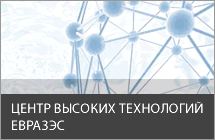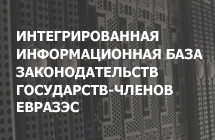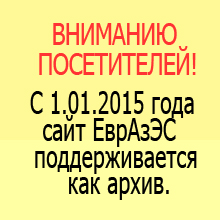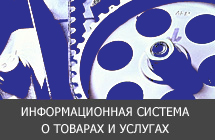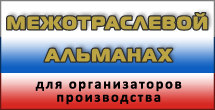|
MODEL REGULATIONS оn the subsidiary organs of the Eurasian Economic Community APPROVED by Resolution of the EurAsEC Interstate Council 27 April 2003, No. 124
MODEL REGULATIONS оn the subsidiary organs of the Eurasian Economic Community
The present Model Regulations define objectives, tasks, competence, and procedures for setting up and for operation of subsidiary organs of the Eurasian Economic Community (hereinafter referred to as the subsidiary organs), as well as procedures regulating their interaction with organs of the Eurasian Economic Community (hereinafter referred to as the Community), and also the rights and obligations of members of the subsidiary organs.
Article 1
1. The subsidiary organs of the Eurasian Economic Community are set up to implement objectives and tasks of the Community and to resolve intersectional and multifunctional issues of the uppermost importance, as defined by resolutions of the Interstate Council of the Eurasian Economic Community (hereinafter referred to as the Interstate Council). 2. The subsidiary organs are set up, restructured and liquidated by resolutions of the Interstate Council based on proposals by the Integration Committee of the Eurasian Economic Community (hereinafter referred to as the Integration Committee). The subsidiary organs shall report and be held accountable to the Interstate Council.
Article 2
1. The proposals on
setting up, restructuring and liquidation of the subsidiary organs are
submitted to the Integration Committee by the states – 2. The Interstate Council lays down the guidelines for subsidiary organs’ activities. Article 3
On issues within the scope of their competence, the subsidiary organs: 1) take measures to implement resolutions of the Interstate Council and objectives set by international treaties signed within the Eurasian Economic Community; 2) interact with executive offices of the Community’s organs in respect of issues pertaining to joint activities specified by their foundational documents; 3) consider issues within the scope of their activities and submit proposals to the relevant organs of the Community as prescribed by the appropriate procedure; 4) analyze integration trends in the relations between states – members of the Eurasian Economic Community, as well as national legislation of the states – members of the Community pertaining to legal relations within the scope of their activities; 5) maintain and develop relations with relevant legislative, executive, and judiciary bodies of states – members of the Eurasian Economic Community; 6) take measures to implement recommendations of the Integration Committee and of the Interparliamentary Assembly, as well as of other organs of the Community, and to implement proposals of councils and committees of the Interparliamentary Assembly as prescribed by the appropriate procedure; 7) participate in the organization of international conferences and seminars, as well as in the development and implementation of interstate projects, programs, and other cooperative activities of states – members of the Community; 8) on an annual basis submit reports on the situation in the relevant sphere of cooperation and records of performance to the Interstate Council as prescribed by the appropriate procedure; 9) maintain and develop relations with relevant organs of other international organizations; 10) discharge other functions within the scope of their competence.
Article 4
Subsidiary organs have the right to: 1) prepare proposals and take measures, while acting within the scope of their competence, aimed at implementing resolutions of the Interstate Council and objectives set by international treaties signed within the Eurasian Economic Community; 2) submit proposals on issues within the scope of their competence and on draft resolutions of the Integration Committee and of the Interstate Council to the relevant organs of the Community for consideration as prescribed by the appropriate procedure; 3) counsel on drafts of international treaties in respect of issues within the scope of their competence; 4) draft recommendations and specific proposals on harmonization (bringing closer together, unification) of legislation of states – members of the Community; 5) request and receive relevant information from the Secretariat of the Integration Committee; 6) submit to the Integration Committee for consideration proposals on signing of treaties pertaining to execution of work relevant to their activities and financed out of funds made available for these purposes.
Article 5
1. The Integration Committee composes of subsidiary organs as advised by the states – members of the Community, and the composition shall be subject to approval by the Interstate Council. The subsidiary organs are composed of heads of relevant executive bodies of the member states of the Community. In discussing an issue, all members of subsidiary organs of the Community have equal rights. 2. Organization of work is the responsibility of Executive Secretary appointed by a subsidiary organ after consultation with General Secretary of the Eurasian Economic Community from amongst senior executive officers and employees of the Secretariat of the Integration Committee.
Article 6
The head of a subsidiary organ is elected by members of the said organ from their own rank by an open vote for a period specified by relevant regulations on the subsidiary organ.
Article 7
The head of a subsidiary organ: 1) presides over meetings of a subsidiary organ; 2) has overall charge in respect of preparation of questions submitted to the subsidiary organ for consideration; 3) exercises supervisory control over implementation of resolutions adopted by the subsidiary organ; 4) attends, presents reports, participates in presenting joint reports at the meetings of the subsidiary organ in case the issues under consideration are within the scope of competence of the said organ; 5) represents the subsidiary organ in relations with organs of the Community and with executive bodies of states – members of the Community; 6) signs documents issued by the subsidiary organ; 7) discharges other functions in accordance with relevant regulations on the subsidiary organ.
Article 8
1. Meetings of subsidiary organs are held as needed but not less than once every half-year. 2. Procedures for the conducting of meetings are defined by rules of procedure of the subsidiary organs.
Article 9
1. Subsidiary organs have the authority of decision in case all their members attend the meeting. 2. If a member of the subsidiary organ is absent at a meeting, his powers may be transferred to another person duly authorized and representing the same member state as the absentee upon presentation of a written confirmation signed by the head of relevant executive body of the member state of the Eurasian Economic Community.
Article 10
1. Resolutions are adopted at the meetings of subsidiary organs. Resolutions of subsidiary organs on procedural issues are adopted by a simple majority of votes. Resolutions of subsidiary bodies on questions within the scope of their competence are adopted on the basis of consensus. If the Parties failed to reach consensus, the resolution is adopted in accordance with Article 13 of the Treaty on the Establishment of the Eurasian Economic Community of October 10, 2000. The adopted resolutions are implemented by relevant executive bodies of the member states of the Eurasian Economic Community in accordance with national legislation to the extent not contradicting the said resolution. 2. Resolutions of subsidiary organs are kept as official records. Resolutions of meetings of the subsidiary organs are signed by heads and secretaries of the said organs. Official records of meetings of the subsidiary organs are kept at the Secretariat of the Integration Committee. Regulations on the subsidiary organs may proscribe to record a particular resolution of a subsidiary organ on the headed paper approved by the said organ.
Article 11
The Russian language is the working language of subsidiary organs.
Article 12
1. The Secretariat of the Integration Committee provides information, legal, organizational and technical support for activities of the subsidiary organs. 2. All expenses associated with financing of meetings of the subsidiary organs are borne by a relevant executive body of the receiving state. All expenses related to participation in the said meetings are borne by a relevant executive body of each sending member state independently. __________
|
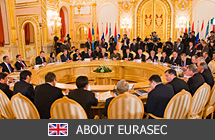
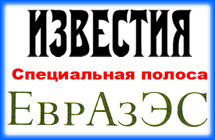
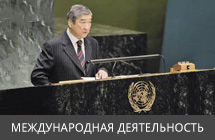
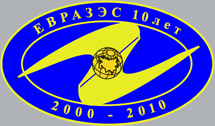
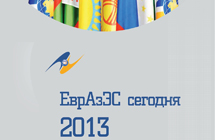
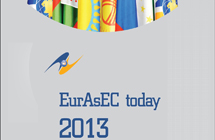
Поиск 10.10.2014 Заседание Межгосударственного совета ЕврАзЭС07.10.2014 Мультимедийная пресс-конференция в агентстве «Россия сегодня»03.10.2014 Встреча с Послом Финляндской Республики04.08.2014 Встреча Генерального секретаря ЕврАзЭС с Послом Республики Таджикистан20.06.2014 Премии Петербургского международного юридического форума «За вклад в развитие правовой интеграции на евразийском пространстве»28.05.2014 Договор о Евразийском экономическом союзе – важнейшее событие в новейшей истории наших стран25.05.2014 Презентация книги «Евразийский проект Нурсултана Назарбаева, воплощенный в жизнь. К 20-летию евразийского проекта 1994–2014»24.05.2014 VII АСТАНИНСКИЙ ЭКОНОМИЧЕСКИЙ ФОРУМ. Панельная сессия «Евразийской экономической интеграции – 20 лет. Итоги и перспективы»24.05.2014 VII Астанинский экономический форум и II Всемирная Антикризисная конференция, 21-23 мая 2014 года, Астана24.05.2014 Петербургский международный экономический форум, 23 – 24 мая 2014 года, Санкт-Петербург |

Евразийское экономическое сообщество
ЕврАзЭС
-
Страны участники
 Беларусь
Беларусь
-
 Казахстан
Казахстан
-
 Кыргызстан
Кыргызстан
-
 Россия
Россия
-
 Таджикистан
Таджикистан
-
 Узбекистан
Узбекистан
-
 Молдова
Молдова
-
 Украина
Украина

